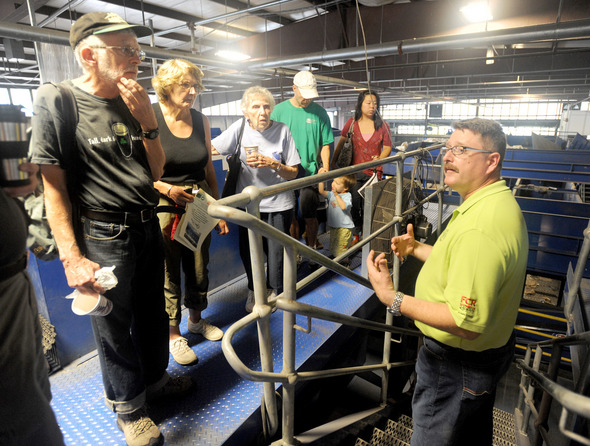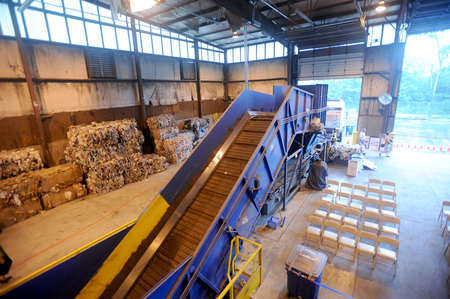Single-stream recycling boosts participation in retooled Ann Arbor program

Ed McArdle, left, listens while facilities manager Kurt Curavo, right, answers questions at the single-stream recycling open house at the city's Materials Recovery Facility on Saturday.
Angela J. Cesere | AnnArbor.com
Mei-lin Louis said she has recycled more in the month since Ann Arbor rolled out its plan to leave the sifting to the city.
With single-stream recycling, she said she has put more items out for collection each week - not just because of the change from bin to a bigger cart, but because the city's recycling program now accepts almost all plastics, like water bottles and that broken laundry basket.
Residents like Louis are part of the reason the monthly volume of materials taken in at the city’s upgraded Materials Recovery Facility has doubled to 4,500 tons since the new program rolled out in July, officials there said at an open house Saturday.
That's when the facility at 4150 Platt Road opened its doors to community members curious to see how single-stream recycling actually works.
On guided tours with plant officials, the participants learned more about the 15-year old facility, which was upgraded this summer with 245 tons of new processing equipment to handle single-stream recycling in Ann Arbor.
Officials explained how one conveyer is outfitted with cameras that take 3 million pictures per second in order to identify and sort out beverage containers with a blast of air.
Materials are collected curbside by workers from service partners Recycle Ann Arbor and a fleet of new city-owned hybrid trucks. At the MRF, each truck is weighed and empties its contents at the beginning of the processing line. Next, a complex system of conveyers, screens, paddles and magnets sifts materials into caged storage bins. Quality control workers pick out anything the mechanized system has missed and others man touch screens that control the system. The baler creates 1,000 to 2,000-pound blocks of sorted material.
Those blocks are loaded onto 16-wheel semi-tractor trailers and delivered to re-manufacturing plants.

A view from the new single stream operation at the city's recycling center, located at 4150 Platt Road near Ellsworth.
Angela Cesere | AnnArbor.com.
Aluminum sorted at the Ann Arbor MRF is sold to Budweiser in St. Louis, Mo. Meanwhile, paper mills, including several in Michigan, buy bales of cardboard and repurpose the material into toilet tissue, and plastics are repurposed into fleece, carpet and re-usable shopping bags, among other items.
“It’s much easier with that single-stream bin, and this facility does all the hard work,” said Jim Frey, the CEO of Resource Recycling Systems, a local firm that assisted with the logistics of the new recycling plan.
Frey noted criticism from some environmentalists who questioned the need for the $4.6 million facility upgrades. They wanted to know why people couldn’t just sift the materials themselves.
The most dedicated would, he said.
“We just tried to make it easier for everybody else.”
It appears to be paying off.
Before single-stream recycling began, the facility sorted and baled 2,200 tons of materials per month. Now, that’s closer to 4,500 tons. The plant has added a shift and doubled the number of workers to keep up.
But recent regional changes to what the city-owned recycling center is taking in have also played a role in the dramatic change, plant officials said. The facility sifts and bales recyclables for roughly two dozen municipalities and waste collection companies.
FCR Recycling/Casella Inc. operates the facility and has cost sharing agreements with the city.
Juliana Keeping is a health and environment reporter for AnnArbor.com. Reach her at julianakeeping@annarbor.com or 734-623-2528. Follow Juliana Keeping on Twitter


Comments
Snarf Oscar Boondoggle
Mon, Aug 23, 2010 : 7:09 p.m.
(slashdot @joe hood) Starting next year Cleveland residents face paying a $100 fine if they don't recycle [ed: and the beatings will continue untl moral imp;roves], and the city's new high-tech trash cans will keep track [ed: we are waaaatching YOU] if they don't. The new cans are embedded with radio frequency identification chips and bar codes [ed: ann arbor has -video-, thwwwwbp!] which keep track of how often residents take them to the curb. If the chip shows [ed: cf., modern times w/cahrlie chaplin] you haven't brought your recycle can out in a while, a lucky [sic] trash supervisor will go through your can [ed: hey! ben dover, i;m loooooking through your can] looking for recyclables. From the article: [ blog.cleveland.com/metro/2010/08/city_of_cleveland_to_use_high-.html ] "Trash carts containing more than 10 percent recyclable material [ed: by weitght or by volume?] could lead to a $100 fine, according to Waste Collection Commissioner Ronnie Owens [ed: unless you are an elected officious]. Recyclables include glass, metal cans, plastic bottles, paper and cardboard. [ed: recycle yor chickne bones to the racoons in your attic] "Owens said Cleveland will conduct a public-service campaign to educate residents about the new collection system and recycling program. [ed: would taht be the upscale version of the _clockwork orange_ re-education experiment, matured, now cast over the whole populus?] "The Division of Waste Collection is on track to meet its goal of issuing 4,000 citations this year," Owens said. [ed: picked upt aht trick frm the poloice quota system, eh? ben dover again.]
ArthGuinness
Mon, Aug 23, 2010 : 9:02 a.m.
@xmo: Nice troll. Many "capitalists" would just be dumping their waste in the nearest river if it wasn't for a little bit of government regulation. A few GREEN activities save money, but many do not; perhaps with different property rights, that would change (for example, giving people ownership over the air they breathe and the water they drink). But those aren't currently the rules, so your simplistic ideas of how things work in the real world aren't practical in any sense.
Joe Hood
Sun, Aug 22, 2010 : 10:03 p.m.
Interesting discussion on Slashdot about Cleveland's non use of smart trash carts will get you a $100 fine: http://news.slashdot.org/story/10/08/22/1346244/Smart-Trash-Carts-Tell-If-You-Havent-Been-Recycling?from=rss
GeeGee
Sun, Aug 22, 2010 : 7:11 p.m.
Since, apparently, A2 had to money to buy this system, the number of years it will take to pay it off is secondary to the amount of trash that is being saved from the landfill. I think it's important to recycle everything we can so we can re-use those resources. However, I would like to see more emphasis on not creating the trash in the first place starting with a strong campaign against bottled water -- the biggest marketing coup ever! People buy bottled water when they can get it for next to nothing. Making and shipping the bottles causes more pollution. And companies like the Nestle are raping Michigan's natural resources in Mecosta http://stopnestlewaters.org/communities/mecosta-county-mi
katie
Sun, Aug 22, 2010 : 6:25 p.m.
Reduce, recycle, reuse. Ok, it's a start. I like the single stream because I think more people will use it and I like that more entities are being served by the program. But, I hate to hear that the glass and plastic are not currently recycled but rather put in the landfill. The danger is that people will not reduce their use of these items, but instead will think they are ok since they will be recycled. Please work hard to find some way for these to be recycled or repurposed. As mentioned by another poster, I also think it's a big problem that the toxic materials are so difficult to recycle or to dispose of. I use CF's and pay to have them recycled. I have a car to drive to the recycling place on Platt, even though I have to take time on a Saturday to do it around my work schedule. I can afford to pay the steep fees. However, people who cannot afford this, who cannot drive, who don't have the time on a Saturday, are likely to dispose of them in the landfill. I'd hate to think that the initial cost to the city for the new program would make it less likely that a solution to the problem of *easy disposal* of toxics will be found until the payback period is up. Easy recycling for toxic waste does need to happen as soon as possible, please!
Speechless
Sun, Aug 22, 2010 : 4:38 p.m.
Yes, this is a very good start given that the switch to single-stream occurred so recently.
jameslucas
Sun, Aug 22, 2010 : 3:24 p.m.
Although the volume of materials recycled is important, it is not as important as what is recycled. What is being collected curbside is almost harmless to the environment. What about oil, batteries, florescent lights bulbs, and electronics these consumables need to be made easier to recycle.
David Cahill
Sun, Aug 22, 2010 : 1:07 p.m.
Doubling the amount of materials is a huge success! I had expected that the amount of stuff being recycled would only increase gradually. But that wasn't so.
RUKiddingMe
Sun, Aug 22, 2010 : 9:58 a.m.
I love that more recycling's being done and all that. Is anyone in charge of comparing the money spent on new system, plus additional shift and more workers, vs. the payoff? If I recall, there was a lot of talk about this paying for itself eventually, and with maintenance costs, etc., I would like to see if it will take 10 years or 3000 to pay for itself. Didn't the new parking meter system wind up showing zero additional parking income, thus being a huge loss? Can A2.com or any readers provide any info on who we can contact for the figures? Thanks.
xmo
Sun, Aug 22, 2010 : 9:26 a.m.
I guess this proves the point that the more money you have the more you can be "GREEN". If the city did not have the money this would not be possible so, thank a capitalist the true "GREEN" people.
KJMClark
Sun, Aug 22, 2010 : 7:31 a.m.
Looking back on all the single-stream recycling coverage at AnnArbor.com over the past year, it looks like Mr. Frey's assertion, that some environmentalists criticized the amount of money, is inaccurate green-bashing. The only criticism I could find was from candidate for Mayor Lesko, and her concerns seemed to be that we should work to reduce waste. The Director of the Ecology Center wrote a letter endorsing the project. Those cameras can't possibly be taking three million pictures per second. The world's fastest takes 6 million, and this article (http://blogs.discovermagazine.com/80beats/2009/04/29/worlds-fastest-camera-snaps-6-million-pictures-in-a-single-second/) and this one (http://www.nature.com/news/2009/090429/full/news.2009.412.html) point out that CCD cameras don't recharge that fast. A conveyor line of even 1 million picture/second cameras would probably cost the entire city budget.
Steve Hendel
Sun, Aug 22, 2010 : 5:24 a.m.
Well, the obvious question is: how much of the increase in gross recycled tonnage since the inception of this new system is attributable to Ann Arbor only and how much to the fact that the facility now processes recycling for numerous other entities? In other words. are Ann Arborites actually recycling more?